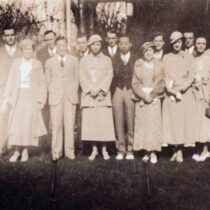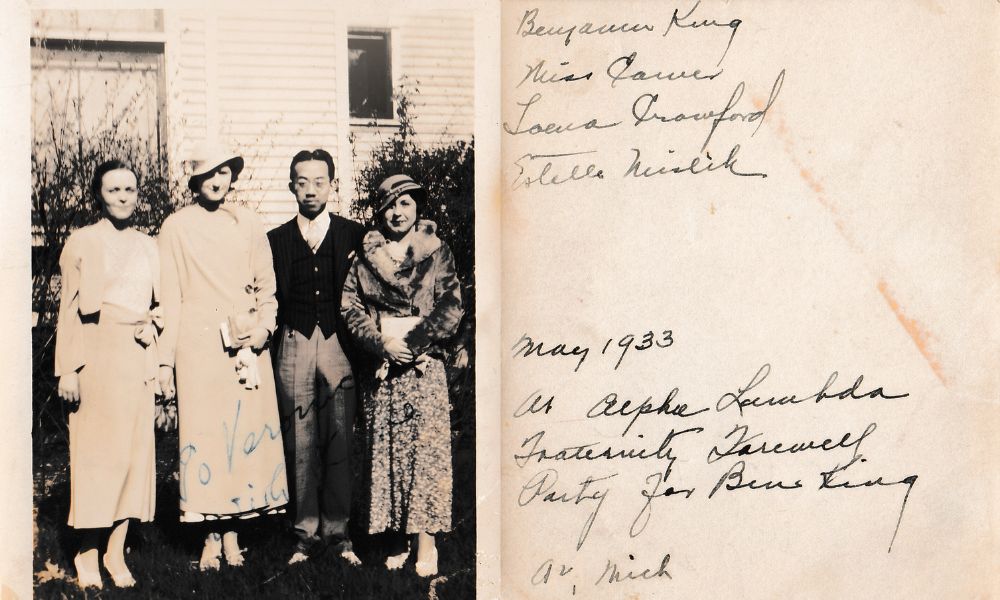Magazine

Sleuthing the Story Behind a Photo
An unusual picture of my grandmother sparked a research quest that started at the Bentley and took me across continents. The story is still unfolding.
By Edward Mears
The daughter of poor Polish immigrants, Estelle Mislik Mears (1909–1992) was a former schoolteacher from Flint, Michigan.
She was the first in her family to attend college—specifically the University of Michigan.
She was also my grandmother.
In 2022, my father and I traveled to New York City to retrieve Estelle’s photo albums from a storage locker in Queens, to find clues about her experiences in Ann Arbor from 1931–1933.
One photo that stood out above all others showed Estelle with an Asian man in front of the former Alpha Lambda Chinese fraternity at 1402 Hill Street, taken in May 1933. The photo was a gift to my grandmother; this man had written “To Veronica, with love, Ben” on the image in blue ink.

Four people, including Estelle Mislik Mears and Benjamin King, at an Alpha Lambda Fraternity farewell party in Ann Arbor, courtesy of Edward Mears.
The desire to learn more about this photo triggered a three-year quest that brought me from the Bentley Historical Library to Hangzhou, China. Along the way, I developed a well-defined picture of my grandmother’s life in Ann Arbor, her circle of friends, and her leadership on campus. I also had an opportunity to learn about the university’s historic connections to China and the experiences of exchange students from that country in the 1930s.
Finding Benjamin
Estelle was white and, during 1930s when she was at U-M, there was “a reluctance of American students to associate with foreign students,” according to Professor Ting Ni in her study Cultural Experiences of Chinese Students Who Studied in the United States During the 1930s–1940s (2002).
Yet here was Estelle in a photo having befriended an Asian student on campus.
On the back of the photograph, Estelle inscribed several notes with the date (May 1933), the photo’s location, and the man’s name, Benjamin King. I was determined to learn more about Benjamin and the nature of his friendship with my grandmother.
I began by searching for Benjamin’s name in The Michigan Daily archives. I found several articles from the early 1930s that mentioned a Chinese student with that name. Chief among them was a series from the spring of 1933 that highlighted the “International Students Conference on World Affairs” held at the Michigan Union’s ballroom that May.
For four days, students and professors transformed the ballroom into a cosmopolitan hub of global discourse, debating pressing geopolitical issues using a format and procedures modeled after those of the League of Nations.
The Daily also mentioned that the chair of the conference’s World Politics Commission was a graduate student named Benjamin King and the Commission’s secretary was my grandmother Estelle. This connection established the likely basis for their friendship and shed new light on my grandmother as a campus leader. Although these articles provided important details of the conference, they failed to illuminate Benjamin’s character. Who was he, and where did he go after Ann Arbor?
I reached out to the Bentley Historical Library to see if there was more information about Benjamin. In response, I received a scan of his student file. From this, I discovered that Benjamin’s real name was Gin Behmin. The file listed his father’s occupation as “Merchant” and a home address in Hangzhou, China. He received his undergraduate degree from Hujiang University in Shanghai and was engaged in graduate studies in law and municipal government at U-M.
As an emergency contact, he listed a B.C. Dih of the Lakeland Community Church in Hangzhou and indicated his religious preference as Baptist. The file also contained letters from Benjamin requesting that the registrar forward his transcript to several U.S. law schools and to the Shanghai Municipal Government.
An image emerged of Benjamin as a highly educated young man of religious conviction, who possessed a strong desire for a career in law and was passionate about improving China’s standing in the world. Alumni postcards in his file suggested that after a brief career teaching law at Peking University, he settled on a career in banking in Shanghai as an employee of the now defunct National Commercial Bank of China. The last update submitted by Benjamin in the file was from 1934.
Tracing Historical Footsteps
I wondered if Benjamin, as a foreign-educated, religious banker, might have fled China when the Chinese Communist Party unified the country in 1949. Nonetheless, I could find no trace of him in places like Hong Kong, Taiwan, or the United States. To learn more, I was compelled to delve into Chinese language sources with the assistance of ChatGPT. I also traveled to Shanghai and Hangzhou in 2024 to trace Benjamin’s footsteps and unravel his story.
I learned Benjamin had spent most of his professional career at the National Commercial Bank of China in Shanghai, where he was a sub-manager and authored one of the first Chinese language books on modern banking practices in 1940. As a member of the Rotary Club, he was well-connected with top bankers and industrialists from Republican-era China and came from an aristocratic family. He also served as vice president of the University of Michigan Alumni Club of Shanghai from 1939 to 1940, while most of the city was occupied by the Japanese.
As a complete surprise, I learned Benjamin had remained in China after the People’s Liberation Army occupied Shanghai in 1949. Considering his background, it remains unclear why he did not seek refuge outside of China. Life was likely difficult for him during the Anti-Rightist Campaign and China’s Cultural Revolution, when the authorities closely monitored and questioned people with foreign ties.
I also connected with several members of his extended family, and I hope that sometime soon I will connect with his surviving children, who may have stories or other artifacts from their father’s time in Ann Arbor.
I still have many questions about why my grandmother gravitated toward Benjamin and developed a friendship with him, but it is clear to me now that they both had similar, outgoing personalities, and shared a curiosity about the world beyond their own cities and countries. Perhaps they also found camaraderie as “outsiders” at the University of Michigan—Benjamin as one of a handful of Chinese exchange students and my grandmother as a first-generation college student from a poor family. I also believe that Benjamin and Estelle found a commonality in the plights of their ancestral countries, as both China and Poland found themselves menaced by belligerent neighbors.
Learning about my grandmother’s relationship with Benjamin in a time of global conflict also gives me hope that similar friendships will endure today as cross-cultural communication and understanding become even more important. And it will be archives like the Bentley Historical Library that help tell the complete story.
